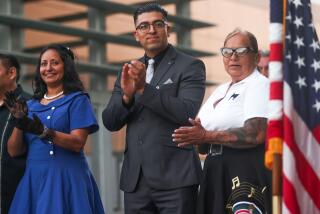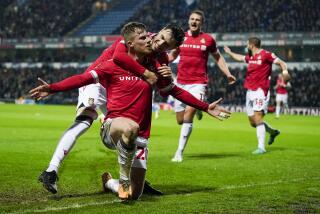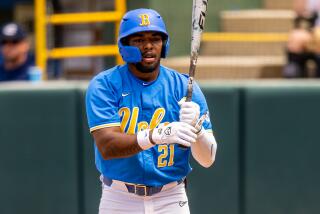IT IS STILL . . . MO’S TOWN
- Share via
BOSTON — Mo Vaughn is coming to town, and the mayor would love to have dinner with him.
“I’ll pay,” Boston Mayor Thomas M. Menino said, erupting into laughter. “And he’s got the big money.”
Sorry, Mr. Mayor. No time. Rain check?
As Mo Vaughn returns to Fenway Park this weekend, for the first time since spurning the Red Sox to sign an $80-million contract with the Angels in November, just about everyone in a city that misses him wants to share a hug, a few words or a meal with the big guy.
In a city that reveres its athletic heroes, the tunnel leading from the airport to downtown Boston is named for Red Sox Hall of Famer Ted Williams. Vaughn wouldn’t want his name on a tunnel, but he might show up to help build one.
There is nothing cuddly about Ted Williams, or Larry Bird, or Bobby Orr. But Vaughn embraced Boston in a bear hug, and the city hugged him back.
“I look back on it as a real relationship,” Vaughn said. “I was a man they knew they could see walking down the street--North End, South End, Blue Hill Avenue, anywhere. I was open.
“You’d see me on the street and I’d talk to you. That’s what the relationship was really about. I was a person they could honestly put their hands out and touch.”
Vaughn visited schools and homeless shelters, sometimes unannounced. He bought tickets for kids to attend the ballet and the circus, and he went with them. He donated time and money to the Boys and Girls Clubs of Boston.
“The mayor would call and tell me, ‘Mo, show up here,’ and I’d be there,” Vaughn said.
Said Menino, “We tried to get other athletes, but you couldn’t get them into our neighborhoods. Mo would go out there and spend time, give them advice, play catch with them.”
Mark Gillam, Vaughn’s business manager, said he received as many as 50 requests a week for appearances, donations and endorsements when Vaughn played in Boston. In 1995, after Vaughn won the American League’s most-valuable-player award, “We had to replace the paper in the fax machine at 8 [o’clock], 12 and 5,” Gillam said.
Vaughn also touched the lives of many thousands he did not meet. He distributed baseball cards with his picture on the front and statistics demonstrating the impact of truancy and dropout rates on young lives on the back. In December, at a youth rally at which Vaughn preached racial harmony and academic achievement, a crowd of 11,000 greeted him with a raucous ovation and serenaded him with a chorus of “Happy Birthday.”
“The shadow of Mo Vaughn touched a lot of people,” said Larry Moulter, president and chief executive officer of Woolf Associates, a Boston sports agency that does not represent Vaughn. “He had a great deal of respect among inner-city, urban kids because he listened to them. Athletes tend not to listen but to speak. Mo not only listened, he put his money and resources into the community.
“Where athletes often want to be film stars or rappers, Mo put before that his responsibility to the community.”
Nowhere is that more evident than in Dorchester, a poorer area of Boston. In the basement of a plain brick government building, in a space secured by Menino, the Mo Vaughn Youth Development Center operates five days a week, fulfilling Vaughn’s desire to transform the lives of children, not simply talk with them and encourage them.
“When I came here, I really didn’t care about school,” said Patricia Nurse, 18, in her fifth year in the program. “I just wanted to do enough to pass. In this program, you can’t do that. From a D student, I became an A and B student.”
A confident and poised young woman too. She asks whether you might like her autograph today, before she becomes famous.
“You’re going to be buying my software,” Nurse said.
No posters of Vaughn, or any other athlete, cover the walls here. The posters are of Martin Luther King, Cesar Chavez and the presidents of the United States. And there is this message as well: “Sneakers eventually wear out. Stock from the sneaker company could earn you money for a lifetime.”
The program enrolls youths 13-18, most from single-parent and/or low-income homes. Students must commit to attend after school, every day, for five hours. In that time they get study hall, guest speakers, academic workshops and a hot dinner.
Sasha Link, 18, signed up when the program started in 1994. She will be its first graduate in June, and she recently received a full academic scholarship to Bridgeport State in Connecticut. Twenty-two participants spent spring break touring historical sites and prospective colleges in the Philadelphia and Washington areas.
Soon, thanks to Vaughn, those kids who do well in school will visit their mentor in California.
“He’ll probably fly them all out to Disneyland this summer,” said Bryan Wilson, associate program director.
Vaughn not only bankrolls the program--he pays half of the $350,000 annual budget from his endorsement revenues--he talks to Wilson virtually daily and the kids weekly. They pass the phone around the room, and--on a long-distance call from California--Vaughn asks each about his or her school, home and social lives.
“It shows the kids someone cares,” Wilson said. “For a lot of the kids, the youth center is their family.”
And that, Mr. Mayor, is why Vaughn cannot join you for dinner this weekend. The Angels and Red Sox play today and Saturday, and Vaughn is planning to invite the kids in his program to his house after Sunday’s game.
Said Wilson, “How many athletes let 25 kids run around their home?”
Since Vaughn left for Anaheim, Wilson said, not one player from the Red Sox, Patriots, Celtics or Bruins has called to ask whether he might visit those kids. The program enjoys the use of donated Celtic tickets--donated by a doctor, not by the team.
Wilson bears no malice, suggesting that players treasure their scarce free time during a season and, unlike Vaughn, live elsewhere during the off-season. Of course, Vaughn has more free time because he has no wife or children of his own.
Menino, the mayor, suggests today’s players make so much money they see no profit in local good will. Moulter, the agent, suggests players and teams engaging in community work may shy away from Vaughn’s high-profile program.
“He’s so popular that, when we go out, people all say, ‘Those are Mo’s kids,’ ” Nurse said.
He is not so popular, to be sure, that he will not hear some boos tonight. Some folks refuse to consider any explanation for turning down $65 million from the hometown team.
Menino, though, will cheer heartily. After Vaughn signed with the Angels, he promptly called the mayor.
“I’m going to be with the Angels but I’ll still help the kids of Boston,” Vaughn told him.
And has any athlete replaced Vaughn in this community?
“Not right now, no,” Menino said.
More to Read
Go beyond the scoreboard
Get the latest on L.A.'s teams in the daily Sports Report newsletter.
You may occasionally receive promotional content from the Los Angeles Times.







